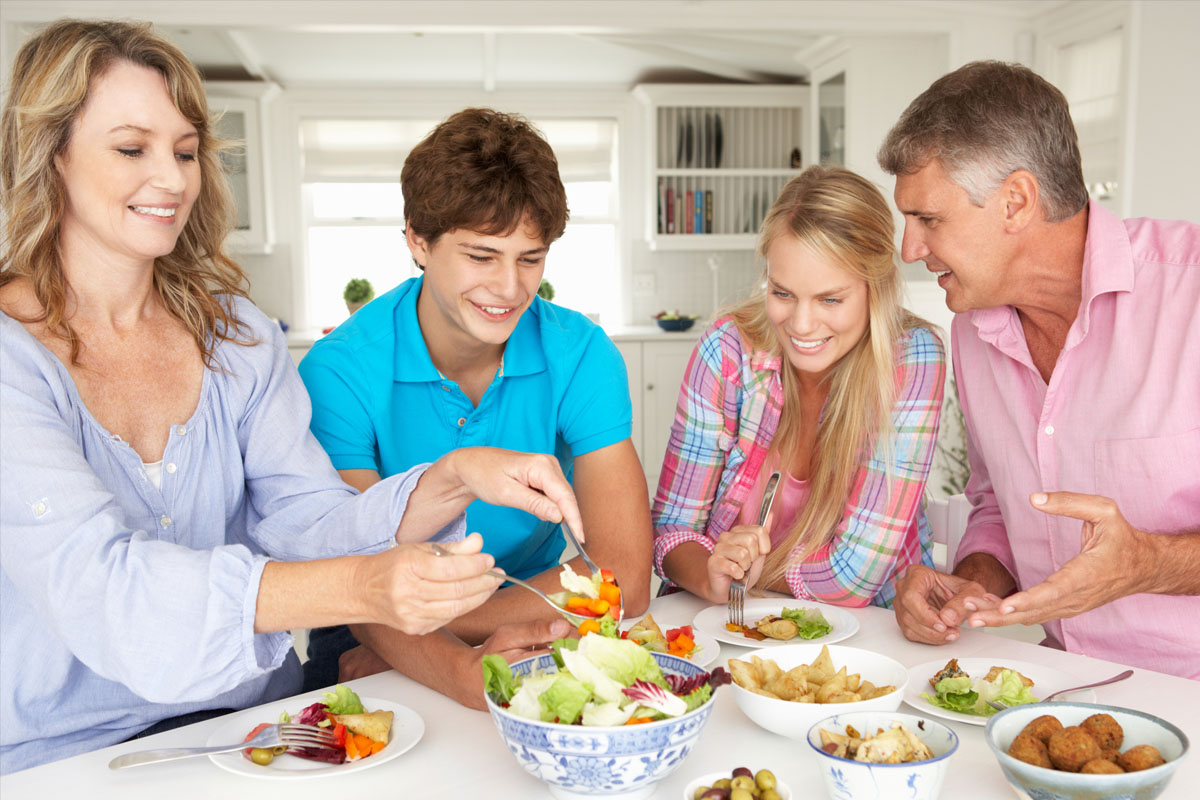As an Accredited Practising Dietitian and parent of two, Teri Lichtenstein is well aware of the challenges in feeding teenagers with rapidly changing bodies and expanding minds of their own. Whilst not everything works perfectly when it comes to teens, below are tried and tested tips for helping them make healthier food choices.
Breakfast with some balance
Research consistently shows that adolescents who eat breakfast have better cognitive function, memory, attention, and problem-solving skills, as well better mood and emotional well-being1 2 3. We also know that eating breakfast is one of the key lifestyle factors linked to less body fat and better school grades among teens.
However, encouraging breakfast for teens who aren't hungry on school mornings or tend to sleep in on the weekend can be a balancing act, and it's important to respect their individual preferences and natural hunger cues. This may mean bigger snacks for morning recess, or a brunch-style breakfast on the weekend. Here are my top three strategies for getting your teen to embrace a healthy breakfast.
1. Go liquid: A simple homemade smoothie with fresh or frozen fruit, yoghurt and milk (preferably one that offers high quality protein, like soy or dairy) is quick and easy to make. It also travels well when rushing out the house and is usually well-tolerated by sleepy (and moody) teens with low appetites. (...)
2. Grab 'n go: Think overnight oats, chia berry pots or breakfast muffins. Any of these items can be prepped the night prior and be ready in the fridge for your teen to grab and go.
3. High-protein brunch: For late weekend brunch, protein and whole grain carbohydrates are key to fueling growth spurts and providing energy for weekend activities. Keep the pantry and fridge stocked with nut butters, ready-to-eat boiled eggs, wholegrain bread and crackers, sliced cheese, cans of legumes and chopped fruit and veggies. If ready-prepared ingredients are on hand, it's more likely your teen will prepare themselves a nutritious meal, rather than complaining there is nothing to eat!
Fueling them right
Whilst teens often prefer less nutritious foods, making sure your kitchen is well-stocked with healthy items can help balance their diet. The trick is to ensure a ready supply of nutritious foods that gets your teen's approval, as their taste and enjoyment should always be prioritised.
Getting your teen involved will help this process. Encourage them to join you for the weekly grocery shop so they get to have a say in what goes in the trolley. Ask for their input into weekly meal planning, or even better get them to help prepare a family dinner meal. All these strategies can drive conversations around fueling their bodies in the right way and help foster a sense of responsibility for their dietary choices.
If you're struggling with healthy food ideas to stock at home, here are my teens' top five favourite snacks that I know will fuel them up and fuel them right.
- Oat sachets: Super easy for any teen to make themselves. They come in a variety of flavours and provide a source of wholegrain oats for long lasting energy;
- Trail mix: Can be made with any combination of seeds, dried fruit, nuts, pretzels and even a small amount of chopped chocolate or cacao nibs for a sweet hit;
- Granola: A favourite for breakfast, after school snack or even a late supper. (...);
- Yoghurt pots: Whether it's a tub of yoghurt enjoyed on its own or topped with fresh berries, seeds or coconut flakes, this is an excellent snack that provides a source of high quality dairy protein to help muscle growth:
- Muesli bars: If buying from the supermarket, compare brands and choose those that are lowest in sugar. (...):
Walk the talk
Adolescents’ brains are like sponges, and whilst they may communicate with grunts and one word answers, they observe and take in everything! Research has shown that parents own diets and eating behaviours have a significant influence on their child's eating habits. This is by the far the greatest impact you can have to help your teen develop healthy eating habits4 5. Practise what you preach by modelling behaviours that you would like your teen to adopt. Here are some strategies to guide you in this process.
- Dinner discourse: Life with teens is busy, so when you do get an opportunity for a family meal, enjoy it! Easy family conversations can alleviate pressure to eat specific foods, and you never know, they may even try something new.
- Mind your language: Avoid labelling foods as good or bad and try not to associate food with body size or appearance. Share your positive thoughts around foods you enjoy and listen to your own hunger cues. Your teen is watching closely and they are likely to follow suit.
- Respect their choices: Adolescence is a time where they naturally pull away from parents and exert more control over the food they do or don't eat. If your teen is eating well 80% of the time they are doing great! When you observe them making poor food choices, try put it in context of the bigger picture. If you have any concerns about their health or development, speak to your healthcare professional, but if not, try let it go.
References
1. Peña-Jorquera H, Campos-Núñez V, Sadarangani KP, Ferrari G, Jorquera-Aguilera C, Cristi-Montero C. Breakfast: A Crucial Meal for Adolescents' Cognitive Performance According to Their Nutritional Status. The Cogni-Action Project. Nutrients. 2021 Apr 16;13(4):1320. doi: 10.3390/nu13041320. PMID: 33923639; PMCID: PMC8073030.
2. Adolphus K, Lawton CL, Dye L. The effects of breakfast on behavior and academic performance in children and adolescents. Front Hum Neurosci. 2013 Aug 8;7:425. doi: 10.3389/fnhum.2013.00425. PMID: 23964220; PMCID: PMC3737458.
3. López-Gil JF, Smith L, López-Bueno R, Tárraga-López PJ. Breakfast and psychosocial behavioural problems in young population: The role of status, place, and habits. Front Nutr. 2022 Aug 23;9:871238. doi: 10.3389/fnut.2022.871238. PMID: 36082031; PMCID: PMC9445130.
4. Mahmood L, Flores-Barrantes P, Moreno LA, Manios Y, Gonzalez-Gil EM. The Influence of Parental Dietary Behaviors and Practices on Children's Eating Habits. Nutrients. 2021 Mar 30;13(4):1138. doi: 10.3390/nu13041138. PMID: 33808337; PMCID: PMC8067332.
5. Birch LL, Fisher JO. Development of eating behaviors among children and adolescents. Pediatrics. 1998 Mar;101(3 Pt 2):539-49. PMID: 12224660.
https://www.sanitarium.com/au/health-nutrition/kids/healthy-diet-for-teens



















